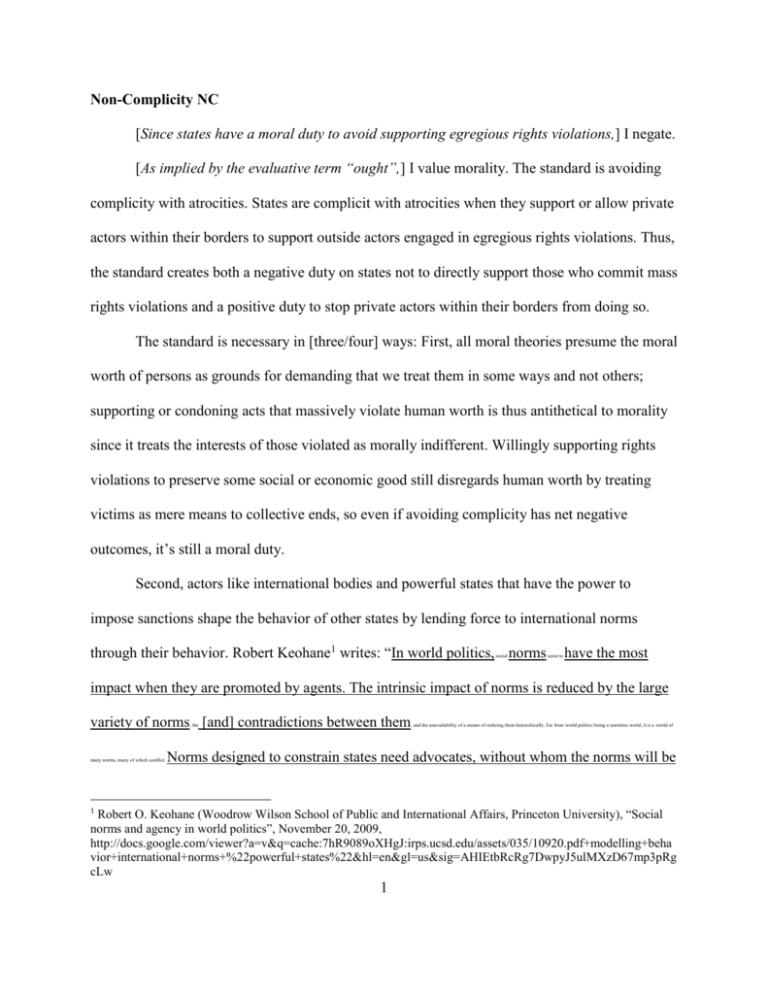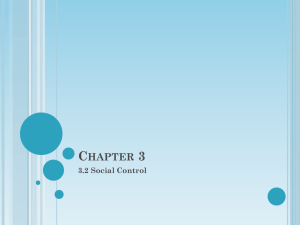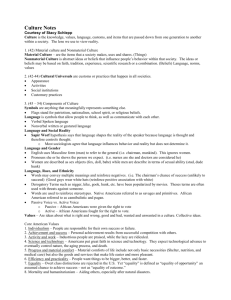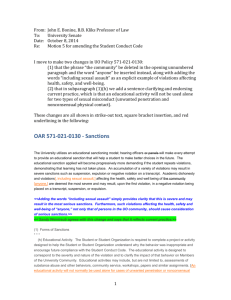Non-Complicity NC
advertisement

Non-Complicity NC [Since states have a moral duty to avoid supporting egregious rights violations,] I negate. [As implied by the evaluative term “ought”,] I value morality. The standard is avoiding complicity with atrocities. States are complicit with atrocities when they support or allow private actors within their borders to support outside actors engaged in egregious rights violations. Thus, the standard creates both a negative duty on states not to directly support those who commit mass rights violations and a positive duty to stop private actors within their borders from doing so. The standard is necessary in [three/four] ways: First, all moral theories presume the moral worth of persons as grounds for demanding that we treat them in some ways and not others; supporting or condoning acts that massively violate human worth is thus antithetical to morality since it treats the interests of those violated as morally indifferent. Willingly supporting rights violations to preserve some social or economic good still disregards human worth by treating victims as mere means to collective ends, so even if avoiding complicity has net negative outcomes, it’s still a moral duty. Second, actors like international bodies and powerful states that have the power to impose sanctions shape the behavior of other states by lending force to international norms through their behavior. Robert Keohane1 writes: “In world politics, norms social seem to have the most impact when they are promoted by agents. The intrinsic impact of norms is reduced by the large variety of norms [and] contradictions between them , the many norms, many of which conflict. , and the unavailability of a means of ordering them hierarchically. Far from world politics being a normless world, it is a world of Norms designed to constrain states need advocates, without whom the norms will be Robert O. Keohane (Woodrow Wilson School of Public and International Affairs, Princeton University), “Social norms and agency in world politics”, November 20, 2009, http://docs.google.com/viewer?a=v&q=cache:7hR9089oXHgJ:irps.ucsd.edu/assets/035/10920.pdf+modelling+beha vior+international+norms+%22powerful+states%22&hl=en&gl=us&sig=AHIEtbRcRg7DwpyJ5ulMXzD67mp3pRg cLw 1 1 easily manipulated by states, which can go ‘norm shopping’ for supportive norms to which they can appeal while they pursue their interests from customary international law suggests that it serves more as a focal point than as a strong constraint on action. . Examining the role of customary international law reinforces the conclusion that agency is critical to the role of social norms in world politics. Indeed, evidence For norms to constrain state action, [therefore,] they must be internalized in domestic politics, taken up by transnational advocacy groups or international organizations, or promoted by powerful states.” Thus, policies which make such actors complicit with atrocities weaken norms against future rights violations, outweighing short-term impacts of non-complicity on timeframe and scale. Third, states have a duty to govern the conduct of their citizens with respect to noncitizens since their agreement to protect their people’s rights can only be achieved in tandem with other states, creating legitimate expectations of cooperation. For instance, we held the Taliban partly to blame for 9/11 even though they played no active role because they failed to act against the people within their borders who planned and financed the attacks. Thus, states have a duty to prevent involvement in atrocities on the part of their private nationals. [Fourth, mass atrocities committed by states against their people are the worst moral bad, so any theory which lets us condone or cooperate them should be rejected out of hand. Jonathan Glover writes: “With disasters on the scale of some in the 20th century, any ethical theory which either justifies them or can give no help in avoiding them is inadequate. The thought at Auschwitz and other places, ‘never again,’ is more compelling than any abstract ethical principle. (There is a parallel with a thought sometimes expressed about another part of philosophy belief in the existence of the physical world is more compelling than the belief in any philosophical theory which purports to disprove it.) persuaded that an otherwise convincing ethical theory could justify the Nazi genocide [we] I should without hesitation give up the theory.”] I contend that without sanctions states would be unable to avoid complicity with atrocities. Kenneth Himes writes: “ the legitimacy of sanctions cannot be reduced to [their But 2 If efficacy] this dimension alone, for sanctions implicitly [also] express commitment to certain norms of international conduct, human rights, and nonaggression. Sanctions reinforce such norms by symbolically ‘punishing’ those who violate them. of revulsion. Thus, in some cases, During the 1980s, arguments for sanctions against Libya did not presume that they would end Colonel Khadaffi's support of terrorism. Rather, the sanctions were seen as an expression sanctions may be imposed primarily to avoid complicity in an evil situation. This is the argument of those who want to ban trade with China because Chinese goods for export are produced under inhuman conditions. [Sanctions can also have deterrent value since, even if they do not reverse the situation that occasioned them , their imposition may persuade [dissuade] other countries from joining in wrongful behavior or dissuade the wrongdoer from further harmful actions.]” There are four links to the standard: First, trading with groups engaged in the commission of atrocities provides them direct financial support, making states and private persons complicit in their crimes. Buying blood diamonds or Sudanese oil has a direct causal link to major rights abuses, so states have a duty to prevent such trade. Second, states risk even more direct complicity through the provision of aid to rogue governments which abuse aid money to fund atrocities. At minimum, states need the option of sanctioning through the denial of aid to avoid directly funding rights abuses. Third, sanctions may be the only way to take a credible stance against atrocities where military action would be ineffective or would harm too many innocent people. Not taking such a stance would tacitly condone the acts of rogue states and weaken norms against their actions. Fourth, apart from the outcomes refusing to sanction, maintaining normal trade relations with states that kill their own people symbolically condones their actions by failing to treat their acts as serious moral evils, thereby disrespecting the moral worth of persons. Lastly, harms that result from cessation of trade don’t dejustify sanctions. First, states only have full control over their own acts, and can’t be held morally culpable for another state 3 letting its people die. The states where sanctions have had the worst effects are those like North Korea and Iraq where dictators made little or no effort to alleviate their people’s suffering. Refraining from action for that reason lets such states in effect use their people as human shields to justify ongoing atrocities. Second, there’s no positive duty to trade with other states. Disease and starvation are natural phenomena which we ought to alleviate, but for which we aren’t morally culpable through our inaction. [Third, we can always counterbalance sanctions with humanitarian aid and exemptions. To the extent that these measures fail to fully overcome the effects of sanctions, it’s either a failure of implementation on our part or a result of policies by the target state with which we aren’t complicit.] [Fourth, at minimum the risk of humanitarian cost dejustifies some but not all sanctions, and means we shouldn’t restrict trade whose revenues support innocent civilians and fund infrastructure. Sanctions against things like blood diamonds or Sudanese oil where funds go mainly or exclusively to target states or militias avoid these human costs, as do targeted sanctions against the funds of regime leaders.] 4






